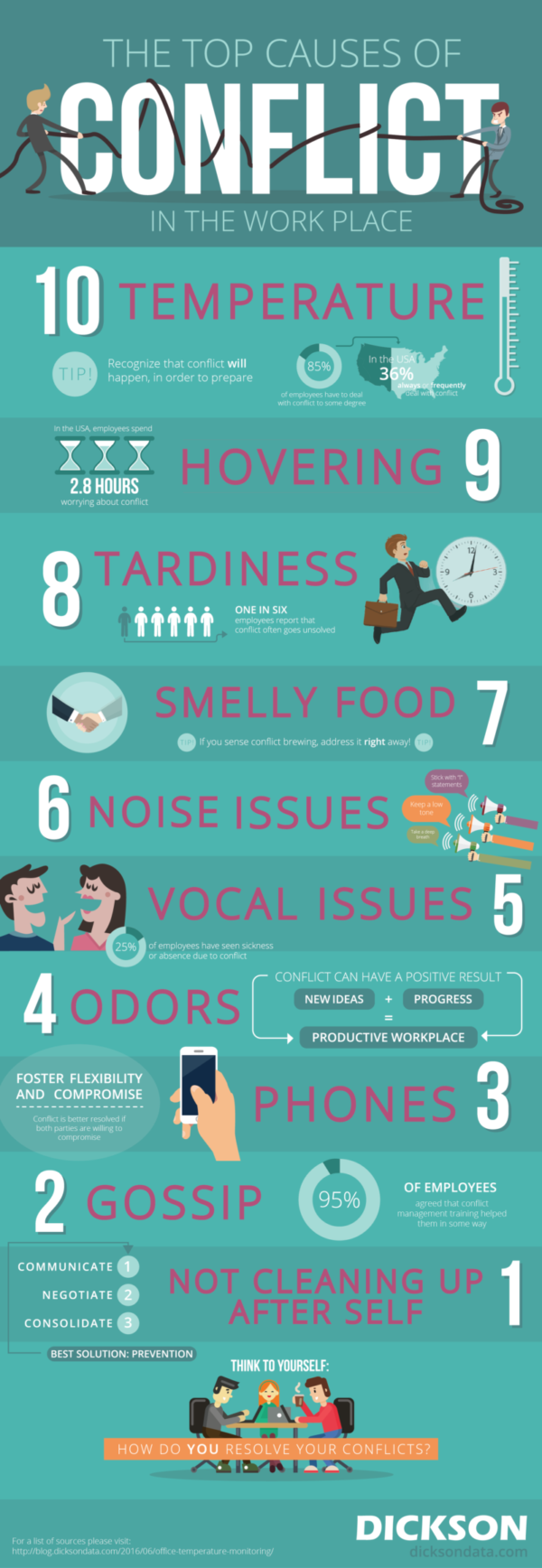If you work long enough you’ll eventually meet someone that just doesn't get office etiquette. You know that person. He’s the one who always leaves his trash in the kitchen after microwaving tuna for lunch. Regardless of if it’s simple or disgusting, poor etiquette can be disruptive to the work day.
One common workplace argument, as you'll see in the infographic below, can actually be explained through science. At what temperature should the office be maintained? It’s a question that the masses fail to agree on. According to the BBC, only 2% of office workers are satisfied with the temperature. Of those who were surveyed, 42% of them believed their building was too warm while 56% felt it was too cool. Here at Dickson, I believe it’s too cold while my desk mate finds it too hot. It means that summertime jackets and sweaters are often my norm, and it’s all because of the different ways our bodies experience temperature.
The feeling of being hot or cold happens at the skin. It regulates temperature to help it maintain consistency as the surrounding environment changes. Writers from the Washington Post explained it as so:
“When it’s chilly, blood vessels in the skin and extremities constrict to keep heat concentrated around the tissue underneath, which is why your hands and feet usually feel cold first. When you’re hot, the opposite happens.”
It’s through that process that we work to warm ourselves up and cool ourselves down. It doesn't however explain why people's responses differ at the same temperature. That can be explained by a number of factors that occur both inside and outside of our bodies. Many of them are even beyond our control. One of the biggest factors involves radiant heat.
Solar energy is warming. It’s why you seek shade on a hot day, and look for the sunlight on a cold one. That’s why the same day could feel too cold from the shade but still feel too hot in the sun. It’s that same idea that makes a 70° day feel warm but a home kept at the same temperature feel cold.
The makeup of the human body is also important to how a temperature feels to you. Your size, gender and even metabolic rate can affect how you respond to it. A lower resting metabolism means women chill easier than men. Their higher levels of estrogen also amplify their blood vessels’ response to cold. These kinds of factors don’t always influence how someone perceives varying temperatures, however they can explain why two people sitting next to each other can feel differently about them.
Boris Kingma, a biophysicist from Maastricht University Medical Center in the Netherlands, took a closer look at temperature variations by gender. He estimated that women required their offices to be 5.4° warmer on average because of their metabolic rates. You can read more on the topic and the formula he derived from his research at the New York Times.
Unfortunately, our differences mean there isn’t a scientific answer that will quell everyone’s concerns. However, there is evidence of a tie between productivity and temperature so try monitoring temperature in your office and compare it to your company’s productivity. Chances are, you’ll find that a warm office is a more successful one. As someone who always feels too cold, I can tell you there’s something warming about being right.

Sources:
- http://mentalfloss.com/article/21120/quick-10-10-most-annoying-things-your-co-workers-do
- http://www.fastcompany.com/3022850/work-smart/10-annoying-irritating-and-absolutely-unbearable-co-worker-behaviors-that-you-dea
- http://www.careerbuilder.com/share/aboutus/pressreleasesdetail.aspx?id=pr926&sd=12/17/2015&ed=12/17/2015
- http://www.dailymail.co.uk/sciencetech/article-3362540/Too-hot-air-office-Temperature-number-one-cause-arguments-workers.html
- http://mychannel957.com/the-top-10things-that-cause-arguments-at-the-office/
- http://www.careerbuilder.com/share/aboutus/pressreleasesdetail.aspx?sd=7%2f2%2f2015&siteid=cbpr&sc_cmp1=cb_pr901_&id=pr901&ed=12%2f31%2f2015
- https://toughnickel.com/business/Somebody-Stinks-Perfume-Cologne-and-Other-Smells-in-the-Workplace
- http://www.careeraddict.com/11-reasons-your-coworkers-hate-you
- http://mashable.com/2014/08/01/annoying-coworkers/#DLOnvUyQpOqr
- http://www.usatoday.com/story/money/business/2014/09/21/wall-st-cheat-sheet-co-worker-types/15832943/
- http://excelle.monster.com/benefits/articles/4785-10-ways-youre-annoying-your-coworkers?page=6
- http://www.mirror.co.uk/news/business/50-most-annoying-things-office-4989841
- https://www.themuse.com/advice/the-bad-work-habits-you-seriously-need-to-break-now
- http://www.huffingtonpost.com/bernard-marr/the-30-most-annoying-offi_b_7311616.html
- http://www.bbc.com/capital/story/20150416-the-worst-office-behaviours
- http://www.huffingtonpost.com/melissa-llarena/from-loud-chewing-to-cher_b_5618525.html
- http://www.huffingtonpost.com/2014/07/11/talkative-coworkers-districations-at-work_n_5578842.html
- https://www.linkedin.com/pulse/most-annoying-office-habits-world-bernard-marr
- https://www.buzzfeed.com/rhiannonsawyer/16-annoying-workplace-habits-fe3k?utm_term=.cqWP8jBDx#.dsrMZzRa6
- http://www.https://www.cpp.com/pdfs/CPP_Global_Human_Capital_Report_Workplace_Conflict.pdf
